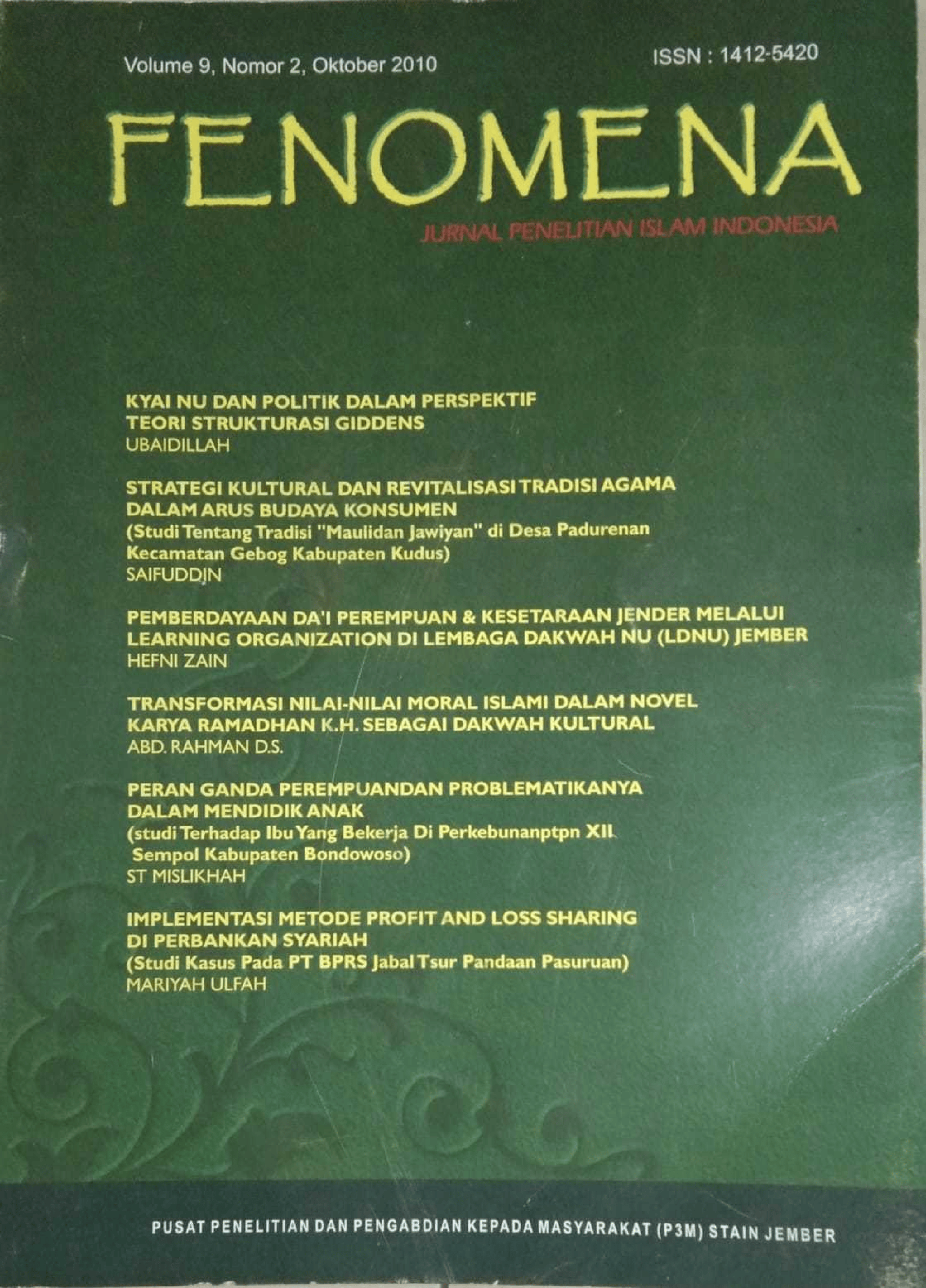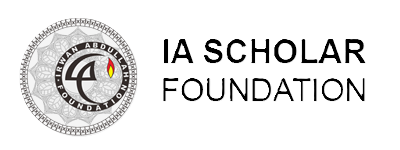Strategi Kultural dan Revitalisasi Tradisi Agama dalam Arus Budaya Konsumen (Studi tentang Tradisi 'Maulidan Jawiyan' di Desa Padurenan, Kecamatan Gebog, Kabupaten Kudus)
Cultural Strategy and Revitalization of Religious Tradition in the Flow of Consumer Culture (A Study of the 'Maulidan Jawiyan' Tradition in Padurenan Village, Gebog District, Kudus Regency)
DOI:
https://doi.org/10.35719/fenomena.v9i2.469Keywords:
Maulidan Jawiyan Tradition, Meaning Revitalization, Consumer Culture, Tradisi Maulidan Jawiyan, Revitalisasi Makna, Budaya KonsumenAbstract
Maulidan Jawiyan is the culmination of activities in the tradition of commemorating the birth of the Prophet Muhammad SAW (maulud), which is still preserved today by the people of Padurenan Village, Gebog District, Kudus Regency, Central Java Province. However, a shift in meaning has occurred due to the wave of globalization, which automatically affects the meaning of the ritual itself. This study reveals the cultural strategies adopted by the Padurenan community in facing the flow of consumptive culture. This reality is supported by historical facts that there is an effort to simplify the meaning of the ritual through the process of cultural commodification that occurs in all aspects of life, so the sustainability of the tradition depends on how far the revitalization of meaning is carried out by the community as the sole heir of the tradition. Of course, the aspect of Islamic values becomes important to study as a text that must confront society, which interprets the text in the context of contemporary culture.
Maulidan Jawiyan merupakan puncak kegiatan dalam tradisi peringatan hari kelahiran Nabi Muhammad SAW (maulud) yang masih dilestarikan hingga kini oleh masyarakat Desa Padurenan, Kecamatan Gebog, Kabupaten Kudus, Provinsi Jawa Tengah. Namun, pergeseran makna terjadi akibat gelombang globalisasi yang secara otomatis memengaruhi makna ritual itu sendiri. Penelitian ini mengungkap strategi kultural yang diambil oleh masyarakat Padurenan dalam menghadapi arus budaya konsumtif. Realitas ini didukung oleh fakta historis bahwa terdapat upaya untuk mendapatkan kesederhanaan makna ritual melalui proses komodifikasi budaya yang terjadi di segala aspek kehidupan, sehingga keberlangsungan tradisi bergantung pada sejauh mana revitalisasi makna dilakukan oleh masyarakat sebagai pewaris tunggal tradisi tersebut. Tentu saja, aspek nilai-nilai Islam menjadi penting untuk dipelajari sebagai teks yang harus berhadapan dengan masyarakat yang menafsirkan teks tersebut dalam konteks budaya kontemporer.
Downloads
References
Abdullah, Irwan. (2006). Konstruksi dan Reproduksi Kebudayaan. Yogyakarta: Pustaka Pelajar.
Al Jabiri, Muhammad Abed. (2000). Post Tradisionalisme Islam. Yogyakarta: LkiS.
Baidocri, Tadjoor Ridjal. (2004). Tamparisasi Tradisi Santri Pedesaan Jawa. Surabaya: Yayasan Kampusina.
Baudrillard, Jean. (1999). Simulacra and Simulations: Disneyland. Dalam Charles Lemert (Ed.), Social Theory, The Multicultural and Classic Reading. Oxford: Westview Press.
Berger, Peter L. (1991). Langit Suci, Agama Sebagai Realitas Sosial. Jakarta: LP3ES.
Berger, Peter L. (1994). Kabar Angin dari Langit, Makna Teologi dalam Masyarakat Modern. Jakarta: LP3ES.
Bourdieu, Pierre. (1984). Distinction: A Social Critique of The Judgment of Taste. London: Routledge and Kegan Paul.
Featherstone, Mike. (2001). Postmodernisme dan Budaya Konsumen. Yogyakarta: Pustaka Pelajar.
Geertz, Clifford. (1973). Interpretation of Cultures. New York: Basic Book.
Giddens, Anthony. (1999). A Phenomenology of Modernity. Dalam Charles Lemert (Ed.), Social Theory, The Multicultural and Classic Reading. Oxford: Westview Press.
Hall, Stuart. (1999). Deconstructing The “National Cultural”: Identity and Difference. Dalam Charles Lemert (Ed.), Social Theory, The Multicultural and Classic Reading. Oxford: Westview Press.
Haryatmoko. (2003). Bourdieu: Menyingkap Kepalsuan Budaya Penguasa. BASIS, Tahun ke-52, November. Yogyakarta.
Horton, Paul, dan Chester L. Hunt. (1964). Sociology. New York: McGraw-Hill.
Miles, Matthew B., dan A. Michael Huberman. (1992). Analisis Data Kualitatif. Diterjemahkan oleh Tjejep Rohendi Rohidi. Jakarta: UI Press.
Moleong, Lexi J. (2002). Metode Penelitian Kualitatif. Bandung: Rosdakarya.
Nasikun. (1997). Memilih Peran Kecendekiawanan dalam Pengembangan IPTEK. Makalah Seminar, disampaikan dalam Konggres HIPIIS ke-VII di Medan, 18-22 Maret.
Nugroho, Heru. (2002). Max Weber tentang Hegemoni dan Sistem Kepercayaan. Yogyakarta: Kanisius.
Nur Syam. (2005). Islam Pesisir. Yogyakarta: Lkis.
Ness, Peter H. Van. (1996). Spirituality and The Secular Quest. London: SCM Press Ltd.
Piliang, Yasraf Amir. (2004). Dunia yang Dilipat, Tamasyu Melampaui Batas-Batas Kebudayaan. Yogyakarta: Jalasutra.
Ritzer, Georg. (2004). Teori Sosiologi Modern. Jakarta: Prenada Media.
Salam, Sholikhin. (1986). Ja’far Shadiq Sunan Kudus. Kudus: Menara Kudus.
Scott, James C. (2000). Senjatanya Orang-Orang yang Kalah. Jakarta: Yayasan Obor Indonesia.
Steenbrink, Karel. (2000). *Beberapa Aspek tentang Islam di Indonesia Abad ke-19*. Jakarta: Bulan Bintang.
Surachmad, Winarno. (1970). Dasar dan Teknik Research: Pengantar Metodologi Ilmiah. Bandung: Tarsito.
Tilaar, H.A.R. (1999). Pendidikan, Kebudayaan, dan Masyarakat Madani di Indonesia. Bandung: Remaja Rosdakarya.
Schroeder, Ralph. (2002). Max Weber Tentang Hegemoni Sistem Kepercayaan. Yogyakarta: Kanisius.
Vredenberg, Jacob. (1986). Metode dan Teknik Penelitian Masyarakat. Jakarta: Gramedia.
Wilczynski. (1986). An Encyclopedia Dictionary of Marxism, Socialism and Communism. London: The Macmillan Press Ltd.
Downloads
Published
Issue
Section
License
Copyright (c) 2010 Saifuddin Saifuddin

This work is licensed under a Creative Commons Attribution-NonCommercial 4.0 International License.















